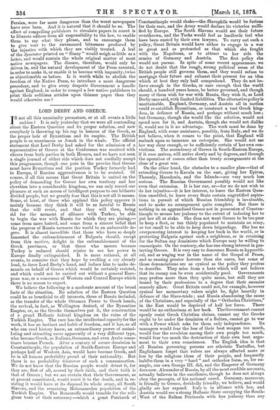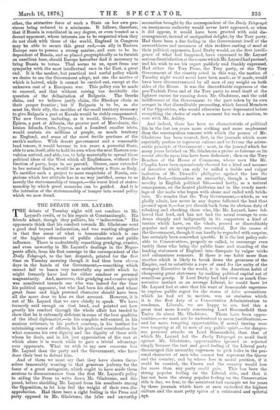LORD DERBY AND GREECE.
JS not all this unanimity premature, or at all events a little sudden ? It is only yesterday that we were all contending about the Eastern Question and its proper solution, and now everybody is throwing up his cap in honour of the Greek, as the proper heir of Byzantium and its empire. The British people is as unanimous as Jonah in the whale. The official statement that Lord Derby had asked for the admission of a representative of Greece at the Conference was received with cheers from both parties in both Houses, and we have not seen a single journal of either side which does not cordially accept this programme, though one puts in the proviso that Greece must have Byzantium and the position Turkey formerly had. in Europe, if Russian aggressiveness is to be resisted. Of course, if all this means that Great Britain is united on the policy of demanding for Greece her own territory and her elevation into a considerable kingdom, we can only record our pleasure at such an access of intelligent purpose to our hitherto divided people, but we greatly fear that this is not all it means. Some, at least, of those who applaud this policy approve it mainly because they think it will be so hateful to Russia that she will resist, and that they will then, being rid for the moment of alliance with Turkey, be able to begin the war with Russia for which they are pining,— some from mere hatred, and some from a sincere belief that the progress of Russia menaces the world to an unbearable de- gree. It is almost incredible that those who have so deeply lamented the enfranchisement of Bulgaria should, except from this motive, delight in the enfranchisement of the Greek provinces, or that those who mourn because Turkey is reduced should rejoice to see her power in Europe finally extinguished. It is more rational, at all events, to conceive that they hope by swelling a cry already loud, to force Lord Derby's hand, and induce him to make de- mands on behalf of Greece which would be certainly resisted, and which could not be carried out without a general Euro- pean war, or a consensus of Western and Central Europe which there is no reason to expect.
We believe the following is a moderate account of the broad facts of the situation. No solution of the Eastern Question could be so beneficial to all interests, those of Russia included, as the transfer of the whole Ottoman Power to Greek hands, the revival, in fact, as Wellington desired, of the Byzantine Empire, or, as the Greeks themselves put it, the construction of a grand Hellenic federal kingdom on the ruins of the Turkish Empire. The race has the intellectual capacity for the work, it has an instinct and habit of freedom, and it has, as all who can read history know, an extraordinary power of assimi- lating and attracting races apparently of a very different type, who become Greek, as Italians, Germans, and even Arabs some- times become French. After a century of secure dominion in Constantinople, the population of South-Eastern Europe and perhaps half of Western Asia, would have become Greek, and be in all human probability proud of their nationality. But there is no probability whatever of such a consummation. We do not know that the Russian people would detest it, for they are, first of all, moved by their faith, and their faith is that of Greece ; but we are certain that their Government, as at present constituted, would resist it to the death, and in re- sisting it would have at its disposal its whole army, all South Slavons, and the remaining Mahommedan population of the Turkish Empire. The Romanoffs would tremble for the reli- gious basis of their autocracy—which a great Patriarch of Constantinople would shake—the,Slavophils would be furious for their race, and the Army- would declare its victories milli, fled by Europe. The South Slavons would see their future overthrown, and the Turks would feel as landlord's feel who have been ousted by their own lawyers. To carry out such a policy, Great Britain would have either to engage in a war as great and as protracted as that, which she fought with the Napoleons, or to attract to her side the armies of Germany and Austria. The first poficy she would not pursue. In spite of some recent appearances. we do not doubt that the rough, strong political' sense of the British people still governs them, and they would refuse to mortgage their future and exhaust their present for an idea which at best they only half comprehend. They da not be- lieve enough in the Greeks, or care enough that the, world should, a hundred years hence, be better governed, and though many of them wish for war with Russia, they' wish it, as Lord Derby once said, with limited liabilities. The alternative policy is unattainable. England, Germany, and Austria all in motion could re-establish Byzantium, or construct a vast Greek king- dom, in defiance of Russia, and perhaps without much loss ; but Germany, though she would like the solution, would not spend men for it, and Austria, though she would not dislike it, would see in it no advantage. The work must be done by England, with some assistance, possibly, from Italy, and we do not believe, when it comes to the point, that England will embark upon so immense an enterprise. She would not see her way clear enough, or be sufficiently certain of her own con- victions. The ascendancy of Greece in South-Eastern Europe, if it ever arrives, will arrive slowly and by degrees, and through the operation of causes other than treaty arrangements at the close of a great war.
On the other hand, the obstacles to a smaller plan—that of extending Greece to Kavala on the east, giving her Epirus, Thessaly, Macedonia, and the Islands—are very much less serious. The Russian Government possibly would not like even that extension. It is her cue, or—for we do not wish to do her injustice—it is her interest, to leave the Eastern Ques- tion unsettled, to leave every State certain ungratified aspire,- tions in pursuit of which Russian friendship is invaluable, and to make no arrangement quite complete. But there is nothing in an aggrandised Greece not in possession of Constan- tinople to arouse her jealousy to the extent of inducing her to put her all at stake. She does not want Greece to be too poor to keep a fleet, or too thinly populated to maintain an army, or too small to be able to keep down brigandage. She has no overpowering interest in keeping her back in the world, or in protecting Bulgaria against such a neighbour, or in retaining for the Sultan any dominions which Europe may be willing to emancipate. On the contrary, she has one strong interest in pro- tecting Greece. It is very easy to denounce Russia as hypocriti- cal, and as waging war in the name of the Gospel of Peace, and as causing greater horrors than she cures, but some of those denunciations are as cynical as the policy they profess to describe. They arise from a hate which will not believe that its enemy can be even accidentally good. Governments may profess more than they quite mean, but still they are bound by their professions to a degree that their enemies scarcely allow. Great Britain could not, for example, however cynical her momentary rulers might be, fight heartily in defence of the Slave-trade ; and Russia abandoning the cause of the Christians, and especially of the "Orthodox Christians," in the East would be deprived of half her force. There would be no enthusiasm at her back. The Government cannot openly resist Greek Christian claims, cannot say the Greeks ought to be under the dominion of a Sultan, cannot go to war With a Power which asks for them only independence. Its managers would fear the loss of their best weapon too much, would fear the revulsion among their, own people too much, would fear too much the destruction of their own best argu- ment to their own consciences. The English idea is that all Russian governing persons are atheistic Tartuffes, but Englishmen forget that rulers are always affected more or less by the religious ideas of their people, and frequently imbibe them in a very " hard " and orthodox form, as, for ex- ample, our own George M. did, and the Emperor of, Germany does now. Alexander of Russia, by all the most credible accounts, actually believes in the excellence, though he does not always obey the precepts, of his national creed. Germany, moreover, is friendly to Greece, decidedly friendly, we believe, and would gladly see her expand. Italy is in alliance with her, and Austria would see a strong Hellenic State occupying the South- West of the Balkan Peninsula with less jealousy than any other, the attractive force of such a State on her own pro- vinces being reduced to a minimum. It follows, therefore, that if Russia is conciliated in any degree or even treated as a decent opponent, whose interests are to be respected when they do net clash with those of the world, England in Congress may be able to secure this great end,—an ally in Eastern Europe sure to possess a strong marine, and sure to be in- dependerit of Russia, and so placed geographically as to furnish an excellent base, should Europe hereafter find it necessary to bring Russia to terms. That seems to us, apart from our sympathy -with the most intellectual race in the East, a great end. It is the modest, but practical and useful policy which we desire to see the Government adopt, not one the motive of which is hatred, while it cannot be carried out, except at the unknown cost of a European war. This policy can be made to succeed, and that without raising too decidedly the
question of the delimitation of Bulgaria. The Greeks claim, and we believe justly claim, the Rhodope chain as their proper frontier ; but if Bulgaria is to be, as she must be, their ally, the sacrifice of the small territory necessary to give Bulgaria a port at Kavala would be richly compensated. The new Greece, including, as it would, Greece, Thessaly, Epirus, a part of Albania, the greater part of Macedonia, the Ionian Islands, Crete, Cyprus, and a hundred smaller islets, would contain six millions of people, as much territory as England, and some of the most fertile 'portions of the earth's surface. With decent government and a reasonable land tenure, it would become in ten years a powerful State, able to arm itself, able to hold its own when the next Eastern con- vulsion arrived, and able, too, to help materially to spread those political ideas of the West which all Englishmen, without dis- tinction of party, hope to see prevail. Greece, once extended to her natural limits, would be as satisfactory a State as Italy. To sacrifice such a project to mere suspicions of Russia, sus- picions which her attitude has in no way justified, seems to us merely the statesmanship of temper,—the worst kind of states- manship by which great countries can be guided. And it is the intrusion of the statesmanship of temper into sound policy which we now dread.



































 Previous page
Previous page